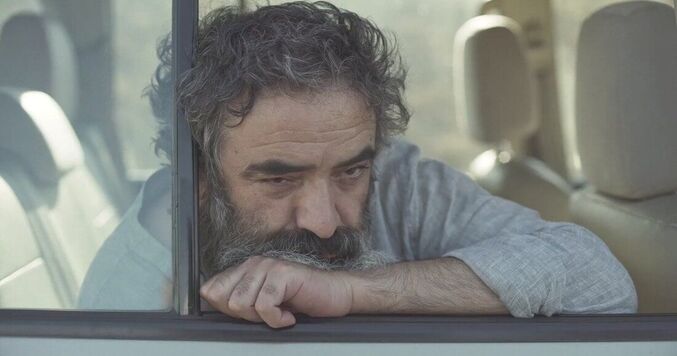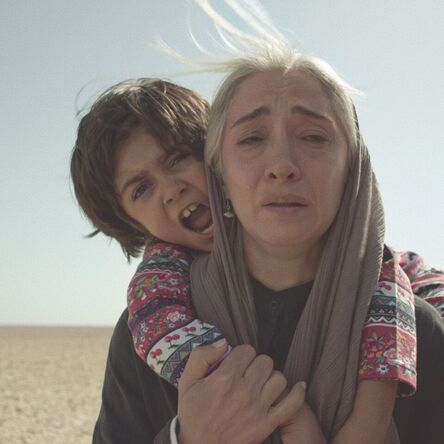HIT THE ROAD
****
Director: Panah Panahi
Screenplay: Panah Panahi
Principal cast:
Pantea Panahiha
Hassan Madjooni
Rayan Sarlak
Amin Simiar
Masoud Tosifyan
Country: Iran
Classification: PG
Runtime: 93 mins.
Australian release date: 25 August 2022.
A middle-aged man with a leg in a plaster cast, a mature woman whose youthful beauty is still visible on her face, a surly twenty-something male, an exuberant, garrulous boy and an ailing dog go on a car trip across Iran. Does that sound like the premise of a joke? It’s not, although much of the proceedings are very funny, because at the touching heart of this story lies a tragedy in the making. Hit the Road is a striking first feature from Panah Panahi, the son of the great film director Jafar Panahi. Coincidently, his father was arrested in Tehran in July and is now facing a six-year gaol sentence for charges originally handed down in 2010 - a protest about his arrest will be held at the forthcoming Venice Film Festival, prior to the premiere of Panahi Sr.’s latest work, No Bears, on 9 September.
The first time we see the family most of them are asleep in the car, taking a break from the road. When the mother (Pantea Panahiha) wakes up she asks her youngest son (Rayan Sarlak), “Where are we?” to which he answers, “We’re dead,” which gives us an introduction to the way this smart-arse kid’s mind works. His father (Hassan Madjooni) calls him “a little shit” but they are affectionate and loving with each other, under the guise of eccentricity and brusqueness. They’re heading for the border with Turkey and it gradually emerges that the eldest son (Amin Simiar) won’t be returning to the city with his parents. Only the boy is unaware of this fact and his Mum and Dad are desperate to keep the realisation from him, making jokes and singing pre-revolution hit songs to distract him as they travel to their ultimate destination.
Although not shot surreptitiously, like his father has had to do with some of his films, Panah’s Hit the Road has some of the same elements as Jafar’s recent work, such as filming in a car (cf. 2015’s Taxi) and using the structure of a road movie (cf. 2018’s Three Faces) to advance his plot. That’s as you’d expect, of course, given that he grew up in a filmmaking environment. He explains, saying, “From childhood, I attended location scouting and was on set for my father’s and Abbas Kiarostami’s films. My parents mainly hang out with cinema people. I grew up in this environment, so I saw many films, and that inevitably formed my eyes… During my studies, I was able to work both as an assistant director and cinematographer to learn first-hand. I was then able to assist my father on his most recent films, from writing to post-production, and I was able to ask him all the questions I could think of.”
The performances by the four main actors are superb: Madjooni and Panahiha are seasoned theatre actors so it’s not surprising that they should deliver such authentic portrayals of the conflicted parents; Amin Simiar is a drama student so has less experience but he too delivers an accurate rendition of a young man unsure about his immediate future, who’s scared and insecure as a result; and young Rayan Sarlak almost steals the show as the spirited child whose energy and verbosity threatens to overwhelm his parents and whose behaviour borders on the manic. He was only six when the movie was shot, so it’s a remarkable achievement given his tender years. Other key components of the film are the extraordinary locations and Panahi’s deliberately obscure screenplay, of which he’s said, “I’d like to leave the perception of the father as well as the other characters and actually the entire film to the viewers. I don’t like to underline or simplify but to leave room for viewers to experiment with the film, using their own senses and forming their own interpretations. Life and art are packed with paradoxes and they are richer if we are left to explore them individually. It’s about creating an opening, an elevation above the limitations set out by norms, to create surprises that trouble and enchant (I hope so at least).”
Hit the Road is, indeed, enchanting while managing simultaneously to be unnerving, putting the viewer in unfamiliar territory. It’s a drama that will tug at your heart-strings and make you laugh while doing so. It has also established the Panahi family as a filmmaking dynasty.
Screenplay: Panah Panahi
Principal cast:
Pantea Panahiha
Hassan Madjooni
Rayan Sarlak
Amin Simiar
Masoud Tosifyan
Country: Iran
Classification: PG
Runtime: 93 mins.
Australian release date: 25 August 2022.
A middle-aged man with a leg in a plaster cast, a mature woman whose youthful beauty is still visible on her face, a surly twenty-something male, an exuberant, garrulous boy and an ailing dog go on a car trip across Iran. Does that sound like the premise of a joke? It’s not, although much of the proceedings are very funny, because at the touching heart of this story lies a tragedy in the making. Hit the Road is a striking first feature from Panah Panahi, the son of the great film director Jafar Panahi. Coincidently, his father was arrested in Tehran in July and is now facing a six-year gaol sentence for charges originally handed down in 2010 - a protest about his arrest will be held at the forthcoming Venice Film Festival, prior to the premiere of Panahi Sr.’s latest work, No Bears, on 9 September.
The first time we see the family most of them are asleep in the car, taking a break from the road. When the mother (Pantea Panahiha) wakes up she asks her youngest son (Rayan Sarlak), “Where are we?” to which he answers, “We’re dead,” which gives us an introduction to the way this smart-arse kid’s mind works. His father (Hassan Madjooni) calls him “a little shit” but they are affectionate and loving with each other, under the guise of eccentricity and brusqueness. They’re heading for the border with Turkey and it gradually emerges that the eldest son (Amin Simiar) won’t be returning to the city with his parents. Only the boy is unaware of this fact and his Mum and Dad are desperate to keep the realisation from him, making jokes and singing pre-revolution hit songs to distract him as they travel to their ultimate destination.
Although not shot surreptitiously, like his father has had to do with some of his films, Panah’s Hit the Road has some of the same elements as Jafar’s recent work, such as filming in a car (cf. 2015’s Taxi) and using the structure of a road movie (cf. 2018’s Three Faces) to advance his plot. That’s as you’d expect, of course, given that he grew up in a filmmaking environment. He explains, saying, “From childhood, I attended location scouting and was on set for my father’s and Abbas Kiarostami’s films. My parents mainly hang out with cinema people. I grew up in this environment, so I saw many films, and that inevitably formed my eyes… During my studies, I was able to work both as an assistant director and cinematographer to learn first-hand. I was then able to assist my father on his most recent films, from writing to post-production, and I was able to ask him all the questions I could think of.”
The performances by the four main actors are superb: Madjooni and Panahiha are seasoned theatre actors so it’s not surprising that they should deliver such authentic portrayals of the conflicted parents; Amin Simiar is a drama student so has less experience but he too delivers an accurate rendition of a young man unsure about his immediate future, who’s scared and insecure as a result; and young Rayan Sarlak almost steals the show as the spirited child whose energy and verbosity threatens to overwhelm his parents and whose behaviour borders on the manic. He was only six when the movie was shot, so it’s a remarkable achievement given his tender years. Other key components of the film are the extraordinary locations and Panahi’s deliberately obscure screenplay, of which he’s said, “I’d like to leave the perception of the father as well as the other characters and actually the entire film to the viewers. I don’t like to underline or simplify but to leave room for viewers to experiment with the film, using their own senses and forming their own interpretations. Life and art are packed with paradoxes and they are richer if we are left to explore them individually. It’s about creating an opening, an elevation above the limitations set out by norms, to create surprises that trouble and enchant (I hope so at least).”
Hit the Road is, indeed, enchanting while managing simultaneously to be unnerving, putting the viewer in unfamiliar territory. It’s a drama that will tug at your heart-strings and make you laugh while doing so. It has also established the Panahi family as a filmmaking dynasty.

